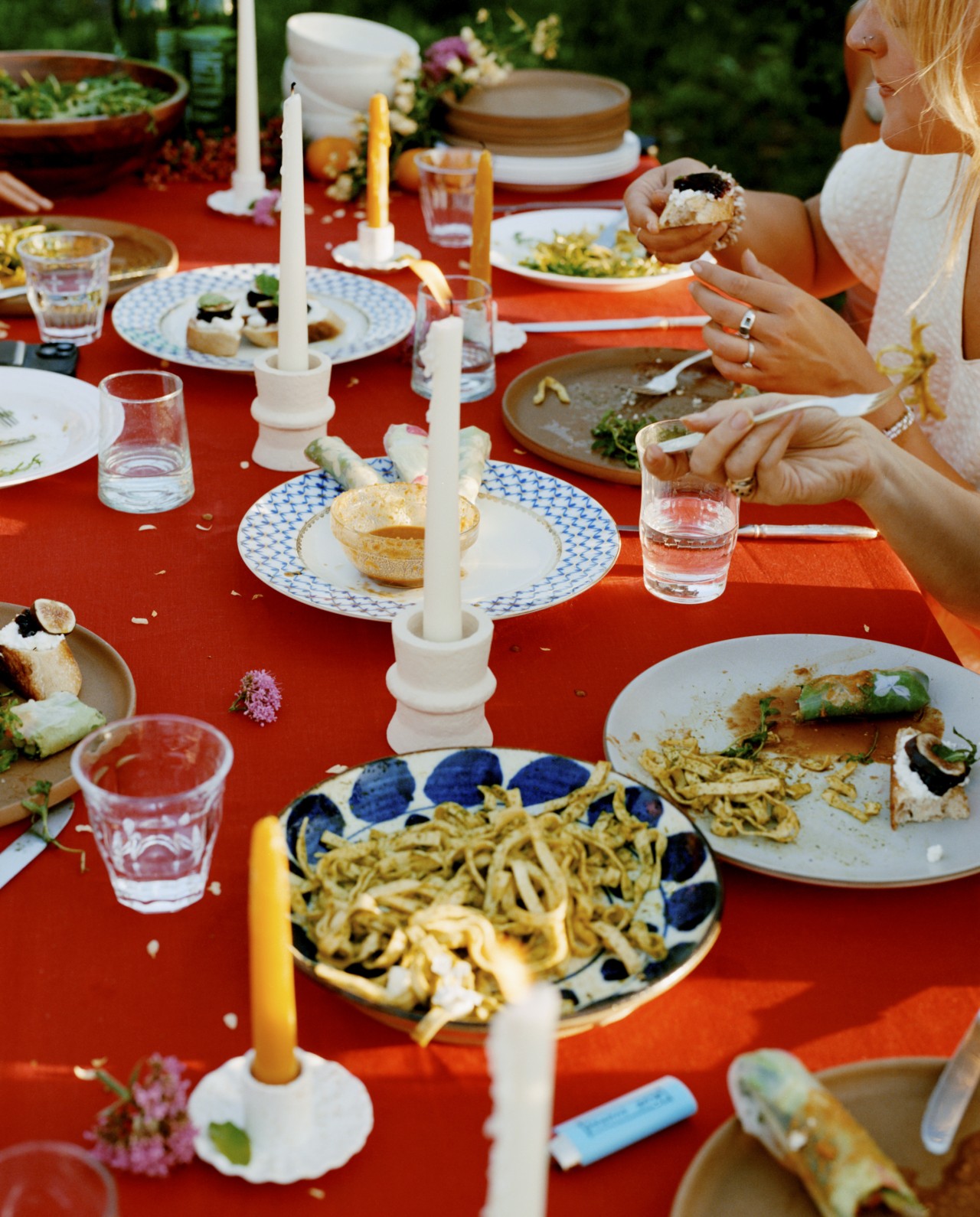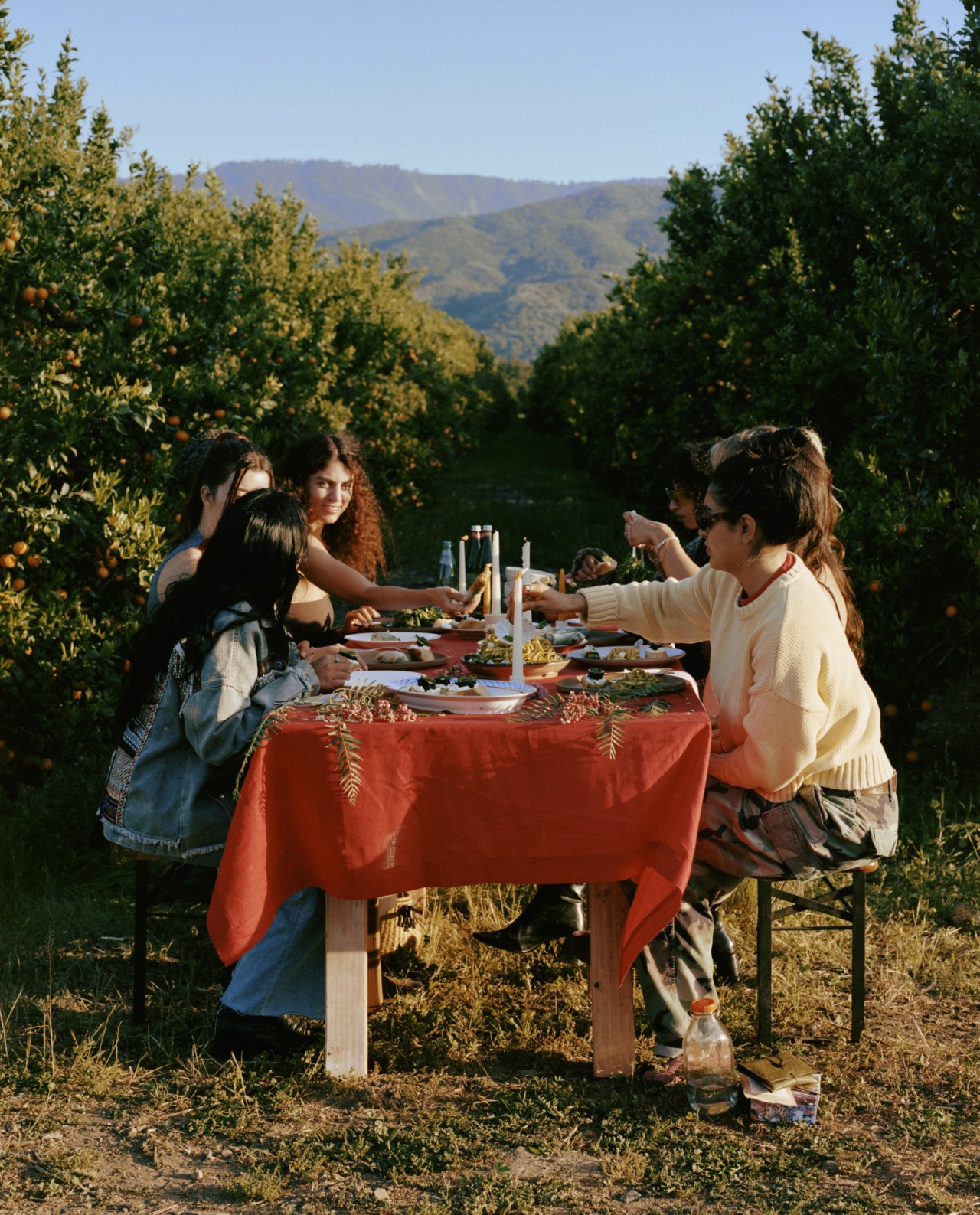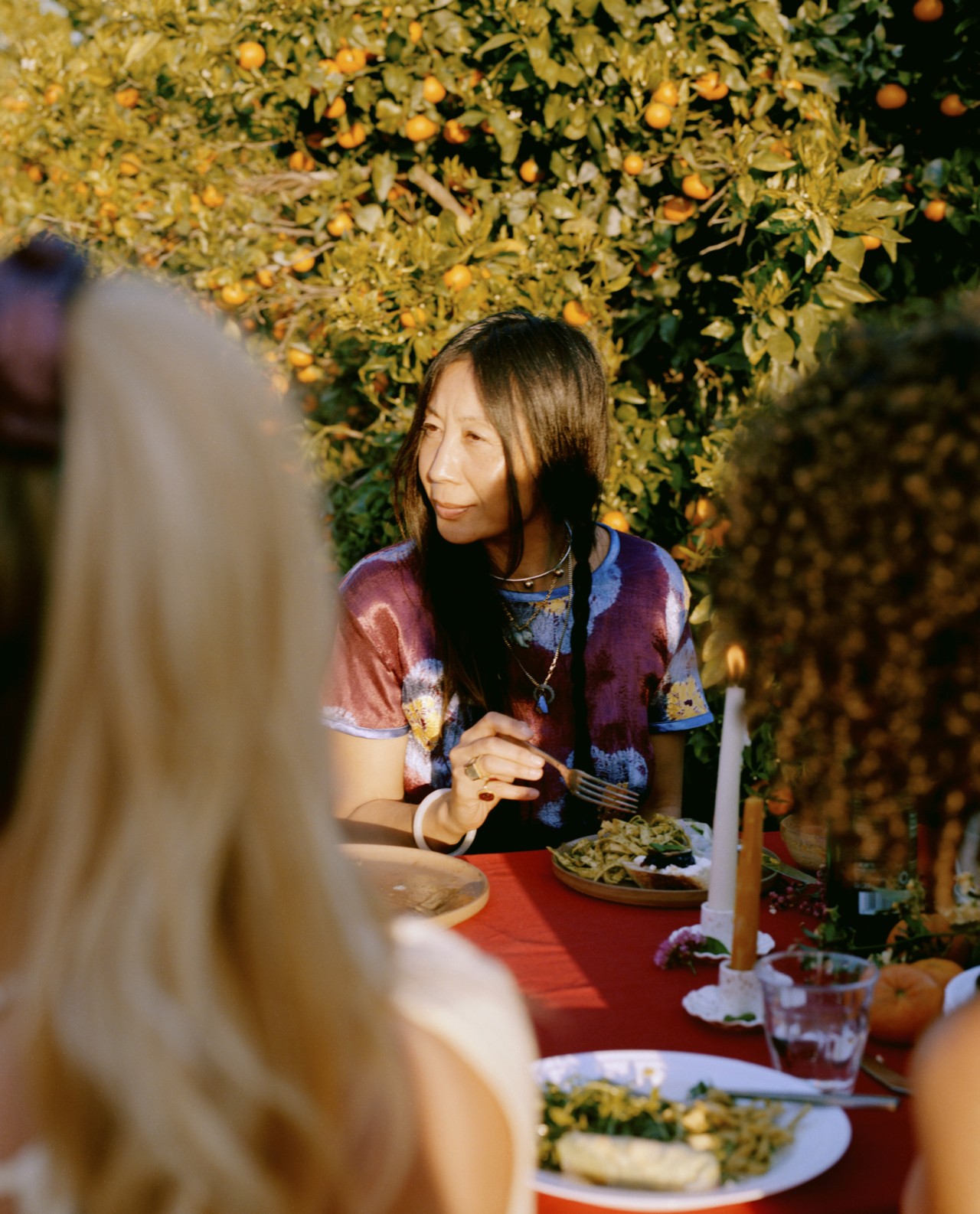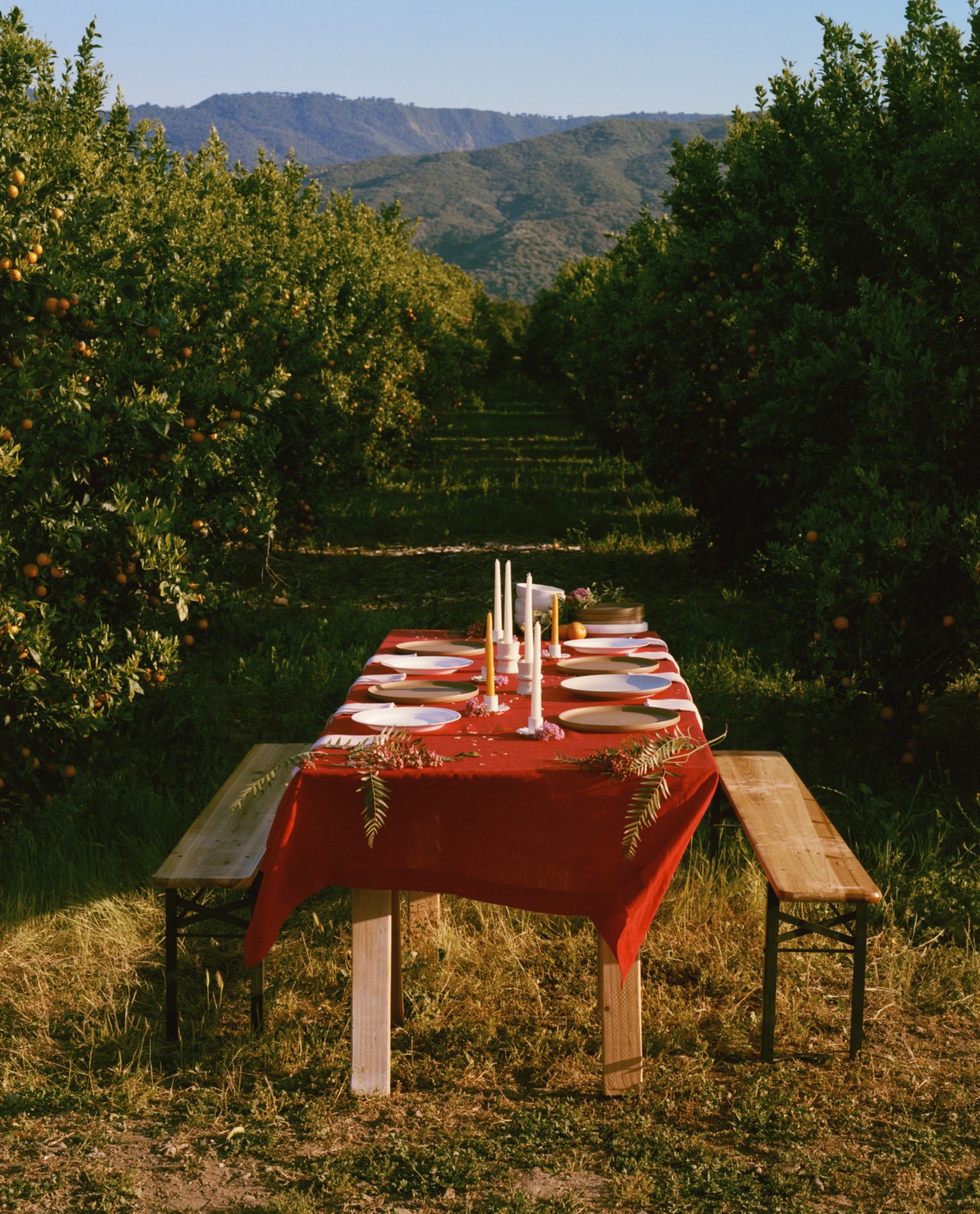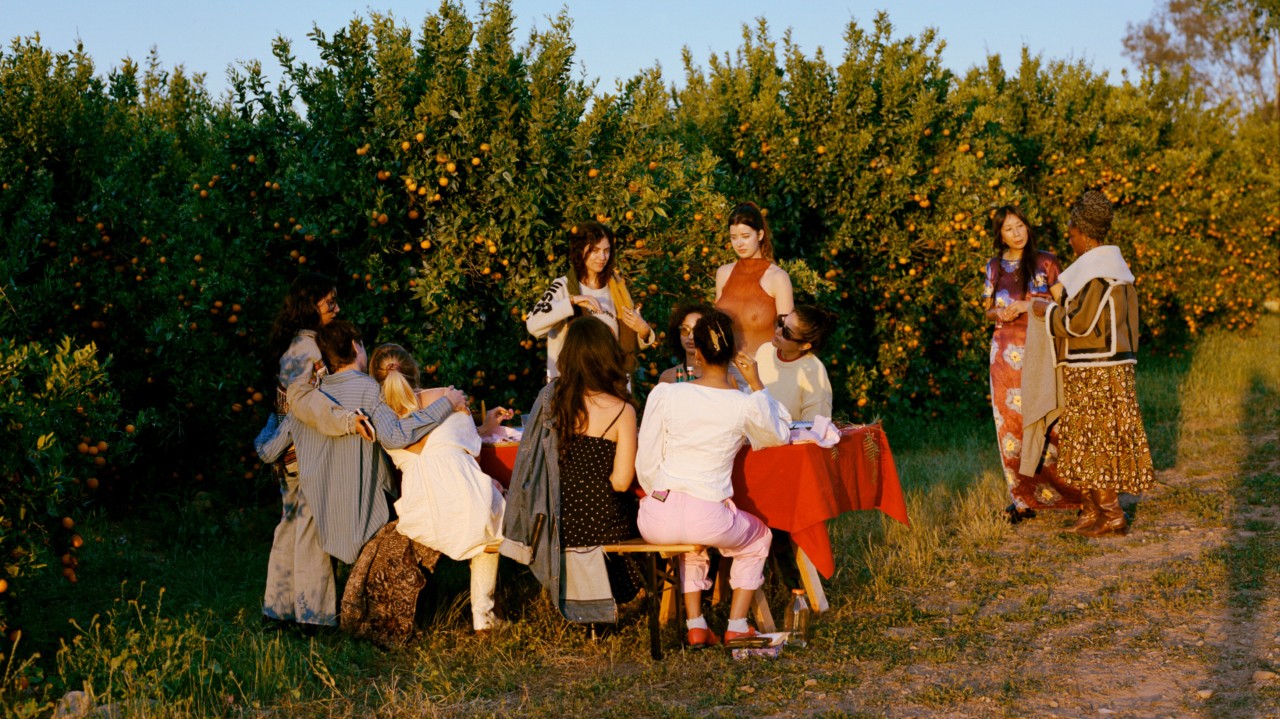
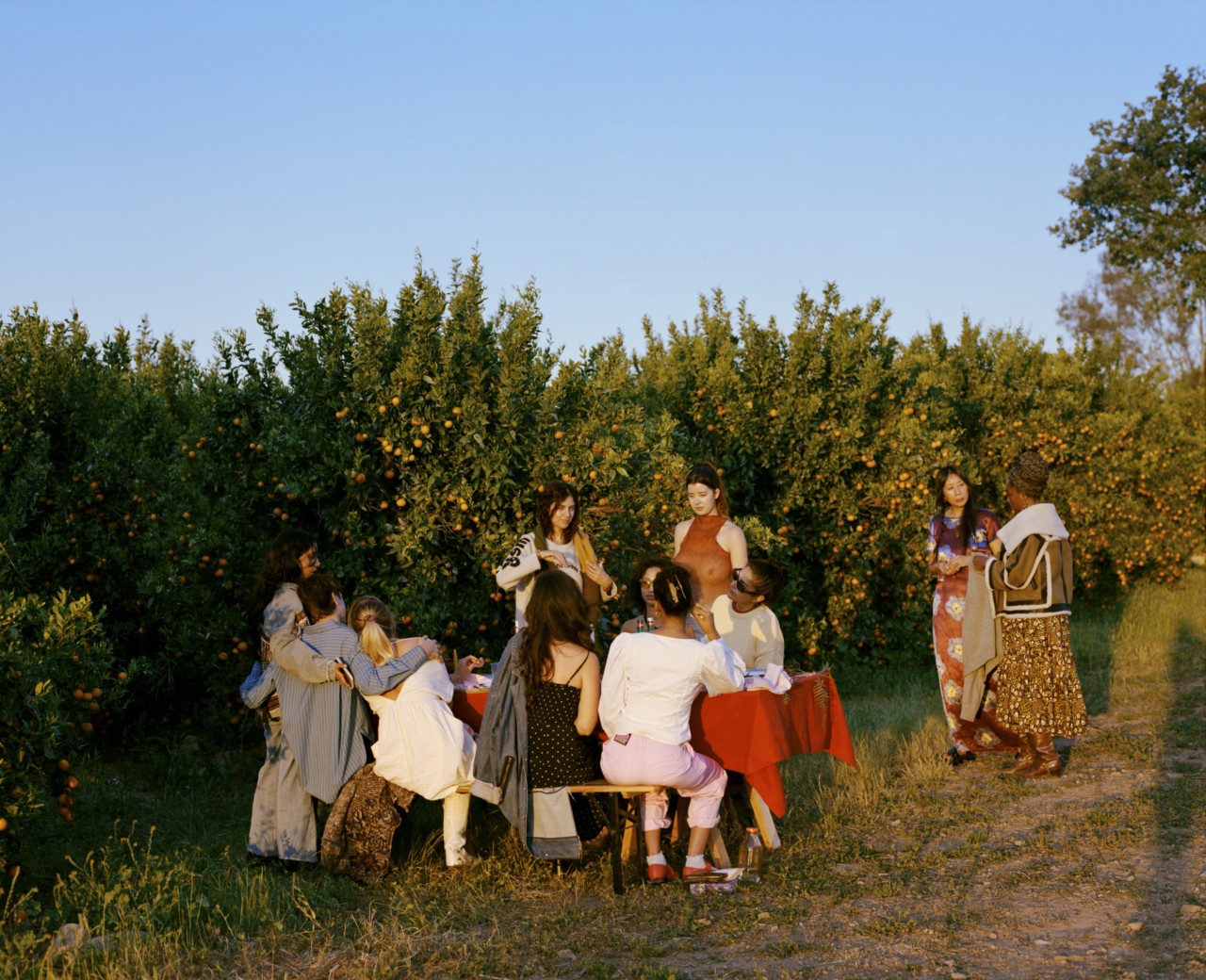
Words by Ecleen Luzmila Caraballo
photographs by peyton fulford
On a bright afternoon, Ojai, California, felt unusually still—shops shuttered, sidewalks empty. But in the Topatopa Mountains, past the natural food stores and quiet streets, something was stirring. At Marmalade Grove, the land bloomed with wild yellow rosa banksiae—or lady banks’ rose—and chef-herbalist Jaskrit Bhalla was ready to add them to the evening’s table.
She and the team were getting ready for a Dirt Girls Collective gathering, a seasonal supper club founded on the idea that food, when shared intentionally, can root people more deeply to place. Earlier that day, Bhalla, one of the supper club’s co-founders, greeted a car full of women with a task that felt deceptively small: Find garnishes for supper. But as they roamed the land, they skipped the small talk, and something else was gathered, too—community.
That evening, over sourdough stacked with honey, ricotta, and blueberry jam, and bowls of bright pesto fettuccine, dinner unfolded slowly. There was no formal toast, no agenda—just the hush of people eating, passing bowls, asking new kinds of questions. “Are you in love?” Chad Riley, a fellow guest and tablescape designer with a fondness for butterflies, asked me. In that moment, I was. There was, and is, so much to be in love with.
Dirt Girls is not alone in its mission to reimagine how—and why—we gather around food. Across the United States, sustainability-minded supper clubs like it are cropping up with an aim to position food not as a luxury, but as a ritual. Their goal is simple and radical: Reconnect more deeply with the land, with each other, and with what still nourishes us in uncertain times.


For many, however, the luxury of a nutritious meal is just that—a luxury. Millions of Americans are increasingly faced with a brutal choice: Pay the rent or put food on the table.
Food insecurity is once again on the rise in the U.S., this time driven by inflation, sky-high grocery prices, and looming federal cuts of at least 20% to the Supplemental Nutrition Assistance Program. If approved, the rollback could slash benefits for millions of low-income families. The cuts would hit the most vulnerable households hardest—especially as food prices remain stubbornly high, according to the Center on Budget and Policy Priorities. And it’s not just an American problem. Around the world, soaring living costs are pushing basic meals out of reach.
In an age of polycrisis, sharing food is more than just sustenance. It becomes an act of solidarity that honors a long history of gathering that dates back to biblical days.
Dirt Girls Collective is devoted to spreading awareness and knowledge on how to lead more sustainable, healthy lives. The collective was co-founded by Bhalla and Sarah McDaniel after the duo saw an overflowing Erewhon Market dumpster filled with perfectly edible produce and prepared foods. Alongside regular dinners, Dirt Girls provides food and assistance to those who need it most, alongside a range of educational resources and workshops to help people connect with farmers, learn composting, experience cob building, and better understand local ecology through classes and walks. Previous workshops have examined ways to reduce household food waste with the help of Jan Rem of Ambrosia Produce Bags, and the role of soil health in building a more resilient food system, taught by Farmer Ben.

“In this day and age, everything is so oriented around stress and having to change things because they’re absolutely fucked,” said McDaniel. “I like the idea of handling an issue when you’re looking at it from a place of calm. That’s how I see these dinners serving the community—creating a space that’s safe to express your confusion or your wonder about the food that you eat, and hopefully be able to bring some enlightenment.”
New York- and London-based supper club Amrūt has a similar mission to nourish both body and community. Access to fresh, culturally resonant food remains uneven across major cities, but Amrūt is carving out space for a different kind of abundance. The plant-based pop-up, founded by Roopa Venkatraman, centers vegetables without compromise—think masala chai, burnt caramel chocolate cake, and richly spiced carrot- and mushroom-forward mains. A Le Cordon Bleu–trained chef and current development studies student focused on food security, Venkatraman draws on both her Indian heritage and culinary training to shape each course.
“What I’ve realized is that everything is a people problem,” said Venkatraman. “And getting people to connect to each other is so, so important in order for us to make any change forward with the environment.” That belief shapes the foundation of her plant-rich, four-course dinners in New York. Venkatraman works with nonprofits like Rethink Food, which redistributes surplus meals to communities facing hunger, and Soapbox Project, which builds joyful, community-led spaces for climate action.


“I focus on the problem of food insecurity through the partnerships of the nonprofits that I work with,” Venkatraman said, adding that each dinner uses thoughtfully sourced meals and channels resources from partner nonprofits into communities facing food hardship.
“Climate action is about community improvement and community connection—and building the world that we want to live in, which is very simple but very hard to do,” added Soapbox Project founder Nivi Achanta. “It’s not just about pulling carbon dioxide out of the air, but about ensuring that people can live their best lives with their best friends on this best planet. And to do that, we need a healthy planet to live on—and people need healthy food.”
Education and community remain the core goals of these emerging supper clubs. But to move beyond trend into lasting infrastructure, they need one thing: financial stability.
Attendance varies widely—from 10 to 20 at traditional longtable dinners with Dirt Girls to 30 or more for some of Amrūt’s Rethink events and over 100 at pop-ups. Tickets typically run between $85-$120. But spaces are routinely set aside at both for guests who cannot afford the full cost, a practice organizers view as essential to making these gatherings accessible.
“Supper clubs generally do not have a large profit margin, and in this model, I am unable to compensate myself for my time,” said Venkatraman, who envisions turning club gatherings into communal cooking sessions where they prepare meals for those in need. “Most of the revenue goes toward reparative tickets at our climate dinners. We gift a third of the seats to guests who want to attend but can’t afford it. Access to community spaces—especially ones addressing climate anxiety—is essential.”

“I like the idea of handling an issue when you’re looking at it from a place of calm. That’s how I see these dinners serving the community—creating a space that’s safe to express your confusion or your wonder about the food that you eat, and hopefully be able to bring some enlightenment.”
It’s a sentiment that’s shared by Dirt Girls. “Transparency is vital,” said Bhalla. “We haven’t made any profit. Any money we do make—either from our dinners or from workshops—goes directly back to the facilitators and farmers.” The next step: forming a nonprofit, employing people to divert green waste to farms, and deepening their impact beyond the table. The founders also plan to donate leftovers to community fridges, launch a seed bank, and acquire land for regenerative agriculture.
But experts caution that while supper clubs and community dinners can build awareness and community, they are no substitute for systemic reform. Without political action, the root causes of hunger—poverty, inequality and policy failure—will persist, and likely worsen as climate change accelerates.
“I’m not saying that those kinds of efforts can’t help, they absolutely can,” said Dr. Susan Babey, a food insecurity expert at the UCLA Center for Health Policy Research. “But it’s very challenging to translate them into long-term solutions, particularly if the reason it’s getting worse is because people have less income; because unemployment is going up; because poverty rates are going up. If safety nets aren’t available for some people, those things are all going to come together to make the problem even worse.”
Dr. Babey added that food insecurity is not always visible. “Sometimes it means people skip meals. Other times it means they rely on cheaper, calorie-dense foods instead of fresh produce, whole grains, or lean proteins.”


Others underscore just how economic precarity is making the problem worse. “I think it’s really important for people to know how hard it is for families to put food on the table,” Crystal FitzSimons, interim president of Food Research and Action Center echoes. “Families have to pay their rent. They have to pay their car payment. They have to pay for gas to get to work and school. Food is actually the most fungible part of a household’s budget.”
Both experts identified SNAP as the most effective federal tool currently available. But proposed cuts from House Republicans—over $200 billion from the Department of Agriculture’s budget over the next decade, most of it from SNAP—could severely undermine that support. With benefits already averaging just $1.40 per person per day, the consequences for vulnerable communities could be devastating.
Supper club organizers are increasingly pairing their meals with advocacy. Some see the gatherings as opportunities to fundraise; others push for direct action, like contacting legislators or embedding financial education into supper club programming. However, they choose to evolve: The throughline for all involved is that regenerative work starts within, and is grounded in care, connection, and community.
“Food insecurity is only becoming more prevalent day by day under the current administration,” said Bhalla. “It’s obviously something that we don’t have all the answers to, but [we are keen to take on] whatever small role we can play in advocating for people that don’t have access to quality food. We also need to inspire people to take matters into our own hands as a collective—and not continue relying on systems that have shown time and again they don’t actually care about us.”

Supper Clubs Bring Bounty in a Time of Food Scarcity
